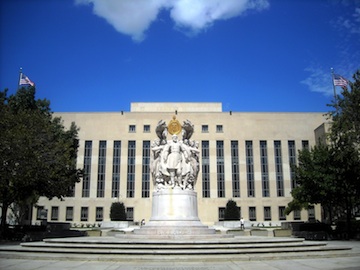Wi-Fi Alliance Tackles AT&T 6 GHz Court Challenge
Tells appeals court FCC was right, appeal should be rejected

The smarter way to stay on top of the multichannel video marketplace. Sign up below.
You are now subscribed
Your newsletter sign-up was successful
The Wi-Fi Alliance, joined by cable and computer companies, is telling a federal appeals court that the FCC was correct in concluding that there is a critical unlicensed spectrum shortage that opening up the 6 GHz band for sharing with unlicensed Wi-Fi will help address. They said the court should reject a challenge to that decision.
AT&T took the FCC to court over the decision because it, along with Verizon and other telecoms, as well utility companies, use the spectrum for backhaul. While the telecoms are all for expanding Wi-Fi, they told the court that opening up the entire band without sufficient protections for incumbents, as they have asserted, was the wrong way to do it.
Utilities and broadcasters, who use the spectrum for electronic news gathering (ENG) have also challenged the decision.
Also Read: Court Denies Emergency Stay of 6 GHz Order
In a brief Wednesday (March 3) to the U.S. Court of Appeals for the D.C. Circuit intervening on behalf of the FCC, the Wi-Fi Alliance was joined by NCTA-the Internet & Television Association as well as individual companies Apple, Broadcom, Cisco, google, Hewlett Packard, Intel and Microsoft, all of whom are all for opening up as much spectrum for unlicensed Wi-Fi as possible.
They told the court that the 6 GHZ band was ideal for sharing with incumbents and the claims that the FCC was "impermissibly" exposing those incumbents to harmful interference misconstrued both the FCC's order and its interference rules, which empowers and obliges the FCC to determine what interference risk is significant, as it did in this proceeding, including by determining that public safety communications would not be harmed.
They said that the fact that AT&T disagreed with the FCC is no reasons to overturn the order.
The smarter way to stay on top of the multichannel video marketplace. Sign up below.
The FCC voted unanimously April 23 to allow the entire 1,200 MHz of the 6 GHz band to be shared with unlicensed Wi-Fi, the FCC's latest move in freeing up more spectrum for connecting 5G in-home devices--video streaming, video calls--and connecting IoT devices to the internet.
In August, the FCC denied petitions by public safety officials and utilities to stay its decision to open up the entire band. Cable ops and computer companies are squarely behind the FCC.
Contributing editor John Eggerton has been an editor and/or writer on media regulation, legislation and policy for over four decades, including covering the FCC, FTC, Congress, the major media trade associations, and the federal courts. In addition to Multichannel News and Broadcasting + Cable, his work has appeared in Radio World, TV Technology, TV Fax, This Week in Consumer Electronics, Variety and the Encyclopedia Britannica.

